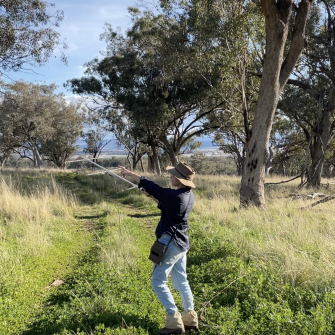Master of Psychology (Forensic)
- Commencing Terms
- Term 1
- Duration
- 2 Year(s)
- Delivery Mode
- Face-to-face (includes blended), Research
- Campus
-
Kensington
- Codes
- Program code 8257
- CRICOS code 028068E
-
Commonwealth Supported Places are available for this program2026 Indicative CSP first year fee
- $14,500*
-
2026 Indicative full fee to complete degree
- $27,500*
-
2026 Indicative first year full fee
- $58,500*
-
2026 Indicative full fee to complete degree
- $122,500*

Application closures for 2026
International applications for all undergraduate programs, as well as postgraduate programs offered by the faculties of Arts, Design & Architecture, Engineering (excluding Master of Information Technology and associated programs) and Science are now closed to New Overseas Student Commencement (NOSC) for 2026 intakes.
Postgraduate programs offered by the Business School and the faculties of Law & Justice and Medicine & Health remain open. Master of Information Technology (and associated programs) also remain open.
- Overview
- What will I study?
- Entry requirements
- Future careers
- How to apply
- Fees & Scholarships
- FAQs
Overview of the Master of Psychology (Forensic)
The Master of Psychology (Forensic) at UNSW is an APAC-accredited postgraduate program that prepares students for registration as a psychologist and a career in forensic mental health or the broader field of psychology and criminology. Over two years, students engage in advanced coursework and hands-on experience in courts, correctional facilities and community forensic services.
The program combines legal theory with psychological expertise, equipping graduates to address real-world challenges at the intersection of psychology and law. You’ll be equipped with knowledge and skills in a multitude of areas, including interviewing and intervention skills, civil and criminal law, psychological assessments, ethical practice and investigative approaches on criminal behaviour.
First offered in 1998, this forensic psychology degree emphasises the integration of clinical, research and legal skills. Students also complete a research thesis on a topic relevant to forensic psychology, providing an opportunity to contribute original insights to forensic clinical psychology.
We also offer a combined PhD/Master of Psychology (Forensic). This four-year, full-time program integrates research, coursework and professional placements, giving students hands-on experience in forensic settings while developing advanced research expertise. It’s ideal for careers in forensic mental health, applied research or academia.
Why study Forensic Psychology at UNSW?
Study Forensic Psychology with the best
The UNSW School of Psychology is one of the best in Australia - we’re ranked #2 in Australia and #32 globally for psychology (QS World University Rankings by Subject, 2025). UNSW Law is ranked #1 in Australia and #12 globally (QS World University Rankings by Subject, 2025) and is a leading Australian centre of rigorous legal education and research. We have strong links with professional practitioners in the areas of clinical, neuropsychological and forensic psychology.
Learn from industry-leading educators
You come to university to learn from the experts – researchers who are leaders in their fields, striving to create new knowledge. The School of Psychology is well known for its research tradition. Many of our staff have international reputations in their respective fields and a number are Fellows of the Australian Academy of Social Sciences. Our staff attract several million dollars in external research funds per year.
Prepare for professional practice
This program includes a professional practice component, where you’ll complete a minimum of 1,000 supervised practicum hours within the UNSW Forensic Psychology Clinic and in at least two other field placement settings. This practical experience will ensure that you develop and demonstrate competence in a wide range of work undertaken by forensic psychologists.
Access cutting-edge facilities
Our teaching facilities and laboratories include world-leading behavioural neuroscience laboratories and cognitive testing laboratories running specialist software that will allow you to design/implement your own psychological research and analyse/interpret the data you collect. You’ll also gain access to laboratories for the analysis of cognition and brain function, including electroencephalography (EEG), transcranial magnetic stimulation (TMS) and eye-tracking.
Want to see more from UNSW Science?
What you’ll learn in the Master of Psychology (Forensic)
UNSW is introducing a new academic calendar from 2028.
We are moving to a new flex-semester calendar. What does this mean for your studies?
The Master of Psychology (Forensic) can be completed in two years of full-time study. Please note that this program is intensive and includes face-to-face learning and professional practice activities that are time consuming and not confined to standard hours. It’s not possible to complete the program part-time while working full-time.
Through this program, you’ll develop advanced knowledge and skills in:
- Psychological assessment across criminal and civil contexts
- Forensic intervention and treatment approaches
- Expert report writing and communication with courts and legal professionals
- Ethical practice and professional standards
- Understanding the interface between psychology and the legal system
- Critical thinking, clinical practice and research design and evaluation
Practical experience in the Forensic Psychology program
The program consists of three components, all of which are compulsory, totalling 96 Units of Credit (48 in each stage).
- Coursework - weekly lectures and seminars with associated written forms of assessment (42 UOC)
- Professional Practice - Completion of a minimum of 1000 hours of supervised practice in forensic settings, weekly Forensic Psychology meetings, and Skills Training Workshops (36 UOC)
- A Research Thesis (18 UOC).
For more detailed information of the Progression Plan and Program Guide, please refer to our postgraduate coursework page.
-
This component consists of weekly lectures and seminars with written forms of assessment.
Stage 1: Core courses
- Applications of Forensic Psychology
- Professional and Ethical Practice (Forensic) 1
- Professional and Ethical Practice (Forensic) 2
- Professional and Ethical Practice (Forensic) 3
- Assessment in Forensic Psychology
- Forensic Interventions 1
- Forensic Interventions 2
- Law for Psychologists 1 or Law for Psychologists 2
- Professional Psychological Practice
Stage 2: Core courses
- Experimental Psychology and Law
- Professional and Ethical Practice (Forensic) 4
- Professional and Ethical Practice (Forensic) 5
- Professional and Ethical Practice (Forensic) 6
- Research Thesis (Forensic) 1
- Research Thesis (Forensic) 2
- Research Thesis (Forensic) 3
- Law for Psychologists 1 or Law for Psychologists 2
- Professional Psychological Practice
-
For this component, you’ll complete a minimum of 1,000 practicum hours. Over the course of the program, you’ll need to complete at least three placements. Placements are completed across various settings both internally and externally.
- Internal: UNSW Forensic Psychology Clinic (UFPC) (formerly the Wentworth Forensic Clinic)
- External: Forensic agencies and organisations
The following courses are available for students within this program:
-
Under the supervision of an academic staff member from the School of Psychology, students will undertake a research project on a topic relevant to forensic psychology. The project will be documented in the form of a journal article-style thesis. The research project is structured in a three-part sequence, as seen below:
Research Thesis (Forensic) 1 is the first course in a three-part sequence (Thesis 1, Thesis 2 and Thesis 3), designed to guide students through the completion of an empirical research project in forensic psychology. Students are expected to enrol in Thesis 1, Thesis 2 and Thesis 3 across Terms 1 to 3 respectively, with each course contributing to the overall assessment of the thesis and research project.
Master of Psychology (Forensic) entry requirements
The minimum entrance requirement is completion of an accredited four-year, or three-year plus a fourth year, APAC-accredited sequence in psychology, including a major research thesis, completed within the last 10 years with Honours Class 1 (85%), or Upper Second Class Honours (75%) or their equivalents.
Psychology qualifications from overseas must include a major research thesis/project and must be assessed by the Australian Psychological Society (APS) as equivalent to a four-year APAC-accredited sequence in psychology completed in Australia. Please note you must have your qualification assessed before you apply.
As the number of places available each year is limited, entry into this program is competitive. Selection is based on academic qualifications, two referee reports and performance at an interview. Only shortlisted applicants will be invited to attend the assessment centre, which must be attended in person at UNSW (Kensington campus). Although work experience is not an admission requirement, applicants with a history of employment will be positively regarded, even if the employment is not necessarily clinically or forensically relevant.
English language requirements
Applicants must:
demonstrate their competency in speaking and communicating in English is sufficient to practise the psychology profession.
satisfy both UNSW's English language requirements and those required by the Australian Health Practitioner Regulation Agency (AHPRA).
All applicants, domestic and international, are encouraged to use AHPRA’s pathway selection tool to guide their understanding of AHPRA’s requirements.
Provisional registration
Before starting the Master of Psychology (Forensic) degree, all students must apply for provisional registration with AHPRA's Psychology Board of Australia (PsyBA). Provisional registration with PsyBA is required to begin clinical placements in the first year of the degree.
Inherent requirements
Inherent requirements are the fundamental tasks and activities needed to achieve the core learning outcomes of a course.
Before applying, it's crucial to read and fully understand these inherent requirements and think about whether you may experience challenges in meeting these requirements.
Career opportunities after the Master of Psychology (Forensic)
There’s increasing demand from legal, investigative, corrective and policy agencies across Australia for psychological expertise to support justice and public safety. Graduates of the Master of Psychology (Forensic) may pursue roles such as:
- Forensic psychologist
- Correctional consultant
- Police or court advisor
- Policy and legislative analyst
- Private consultant in forensic mental health or risk assessment
Forensic psychologists work across diverse environments including prisons, courts, probation and parole services, child protection, juvenile justice, insurance, mediation, private practice and public policy development.
Accreditation
The program is accredited by the Australian Psychology Accreditation Council (APAC) as a fifth and sixth year of study. Graduates are eligible to apply for full membership of the Australian Psychological Society (APS) and registration as a psychologist with the Psychology Board of Australia (PsyBA).
Graduates are also eligible for Associate Membership of the APS College of Forensic Psychologists. After completing a Psychology Board of Australia approved Forensic Psychology registrar program, graduates are eligible to apply for APS College of Forensic Psychology Fellowship and endorsement as a Forensic Psychologist.
Our alumni
“The Masters of Psychology (Forensic) program at UNSW provided a well-rounded mechanism through which to enter the field of forensic psychology. Exposure to teaching by the Law faculty inspired consideration of the complex nature of the clientele and the issues they face from within the criminal justice system, which added to the empirical focus on the human condition which the UNSW School of Psychology built into me over my time there. Their dedication to ensuring all students have access to the skill-building and experience required to expose them to the reality of forensic psychological work was greatly appreciated.”
Sam Ardasinski
Senior Psychologist (High Risk Offenders) Serious Offenders Assessment Unit, Corrective Services NSW
How to apply for the Master of Psychology (Forensic) at UNSW
Domestic students: Applications open on 1 August 2025 and close 3pm AEDT, 31 October 2025.
Onshore and offshore international students: Applications are closed.
The application process is the same for domestic and international applicants.
1. Submit your application
- Apply online through the UNSW Apply Online service
- Include these documents:
a. Completed Supplementary Application Form (PDF).
b. Current or completed transcript of a four-year APAC-accredited psychology degree (or international equivalent).
c. Your CV.
d. Australian Psychological Society (APS) assessment letter (for international qualifications only).
- Ensure all documents are submitted by the application deadline, late submissions will not be accepted.
2. Receive acknowledgement
- You'll get an email from UNSW Admissions confirming receipt of your application.
- Complete applications will be forwarded to the School for assessment.
- Incomplete applications will be on hold until the final day of submission. Make sure to submit all documents by this date.
3. Share references
- Use the Psychology Reference Portal to share two references with UNSW.
- The School will only consider applications with two completed references.
The School will check if you meet the eligibility requirements:
- If met: Your application goes to the Selection Committee.
- If not met: You'll receive an email with the outcome.
4. Shortlisting
After the application deadline, the Selection Committee will start shortlisting.
Applications without complete documentation will not be considered.
- The School will notify applicants if unsuccessful in being shortlisted via email.
5. Interview/Assessment Centre
Shortlisted applicants will be invited to an interview (Clinical) or an Assessment Centre (Forensic) in late November/early December.
- Details will be announced in November.
6. Outcome
- Successful: The School will contact you to congratulate you on the successful outcome, then you'll receive a formal Letter of Offer from Admissions.
- Unsuccessful: The School will email you the outcome, followed by formal correspondence from Admissions.
-
- Intake: Term 1 is the only available intake for this program.
- Program quotas: There are limited places available each year. Even eligible applicants might not get a place due to these quotas.
- Proof of registration: You’ll need to provide proof of registration and endorsement from the Psychology Board of Australia in your application. You can download a copy of your Certificate of Registration from the Australian Health Practitioner Regulation Agency (AHPRA), which shows your current registration and endorsement area.
- International qualifications: Must have the qualification(s) assessed by the Australian Psychological Society (APS) before applying.
- Inherent requirements: Review the inherent requirements before applying.
For more information, please refer to our FAQs.
Ready to start your application?
Fees and scholarships for the Master of Psychology (Forensic)
You may be eligible for a Commonwealth Supported Place (CSP) for this degree/program. Domestic students who receive a CSP will have a substantial proportion of their fees subsidised by the Australian government. Start your postgraduate application today with our guide on how to apply.
*The indicative Commonwealth Supported Place (CSP) fees are an estimate based on the relevant student contribution band/s for a Commonwealth Supported Place undertaking a standard full-time load of 48 units of credit per year (1 Equivalent Full Time Student Load/1 EFTSL). To find out more about Commonwealth Supported Places visit Postgraduate Commonwealth Support.
Commonwealth Study Assistance such as Austudy, and Youth Allowance is available for some master’s degrees. For the most up-to-date information and list of degrees visit UNSW Current Student Financial Support.
*The indicative Commonwealth Supported Place (CSP) fees are an estimate based on the relevant student contribution band/s for a Commonwealth Supported Place undertaking a standard full-time load of 48 units of credit per year (1 Equivalent Full Time Student Load/1 EFTSL). To find out more about Commonwealth Supported Places visit Postgraduate Commonwealth Support.
Indicative fees are a guide only and have been calculated based on the typical enrolment patterns of students undertaking the degree/program. The indicative fee listed here is an estimate for tuition only and excludes non-tuition fees and charges. The amount you pay will vary depending on the calendar year of enrolment, the courses you select and whether your study load is more or less than 1 Equivalent Full Time Student Load (48 units of credit (UOC) per year).
You should not rely on indicative fees as fee increases are assessed when required and may exceed the indicative figures listed here. Actual fees are calculated on enrolment. More information on fees can be found at the UNSW fees website.
*Fees are subject to annual review by the University and may increase annually, with the new fees effective from the start of each calendar year. The indicative fees listed here are based on an estimated average and are for tuition only, other fees and charges are not included. The amount you pay will vary depending on the calendar year to enrol, the courses you select and whether your study load is more or less than 1 Equivalent Full Time Student Load (8 courses per year).
Indicative fees are a guide for comparison only based on current conditions and available data. You should not rely on indicative fees. More information on fees can be found at the UNSW fees website.
Indicative fees to complete the program have been calculated based on a percentage increase for every year of the program. Fee increases are assessed annually and may exceed the indicative figures listed here.
Indicative fees to complete the program include tuition plus an estimate of study-related costs of approximately $1,000 per year. To find out more about other costs, visit UNSW International.
Scholarships
At UNSW, we award over $83 million in scholarships each year. We pride ourselves on rewarding excellence and making university accessible to students from all walks of life. Whether you’re a domestic or international student, our range of scholarships, prizes and awards can support your journey.
Master of Psychology (Forensic) FAQs
-
Forensic psychology is the study of human behaviour within the context of crime, law and justice. It combines principles of psychology and law to understand criminal behaviour, mental health and legal decision-making. This field bridges psychology and criminology, helping professionals apply psychological theory and evidence to real-world legal and forensic mental health issues.
-
Forensic psychologists assess, diagnose and treat individuals involved in the legal system. Their work includes psychological assessment, expert reporting and intervention with offenders and victims. They may provide advice to courts, police and correctional services, consult on risk management and contribute to rehabilitation programs.
-
To become a forensic psychologist in Australia, you’ll typically need to:
Complete an APAC-accredited undergraduate psychology program – a four-year forensic psychologist degree or equivalent with Honours, such as the Bachelor of Psychological Science (Honours) or Bachelor of Psychology (Honours). If you’ve completed your bachelor’s degree through an alternate pathway, you can also receive your honours through the Graduate Diploma in Advanced Psychology..
Enrol in a psychology postgraduate program such as the Master of Psychology (Forensic), an APAC accredited psychology program offering advanced training in forensic clinical psychology.
Gain provisional registration with the Psychology Board of Australia via AHPRA.
Complete a two-year registrar program to achieve endorsement as a forensic psychologist.
Learn more about how to become a psychologist.
Progress starts here – at a world-leading university

Top 20 Worldwide
UNSW is ranked #20 university in the world
QS World University Rankings, 2024–2026

Most Employable Graduates
Winner of the AFR Most Employable University Award seven years in a row
AFR Top100 Future Leaders Awards, 2020–2026

Australia's #1 for Innovation
Highest number of startups and spinouts from university-developed tech
SCOPR report, 2024






